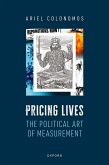This book explores how Hobbes's political philosophy has occupied a pertinent place in different contexts, and how his interpreters see their own images reflected in him, or how they define themselves in contrast to him. Appropriating Hobbes argues that there is no Hobbes independent of the interpretations that arise from his appropriation in these various contexts and which serve to present him to the world. There is no one perfect context that enables us to get at what Hobbes 'really meant', despite the numerous claims to the contrary. He is almost indistinguishable from the context in which he is read. This contention is justified with reference to hermeneutics, and particularly the theories of Gadamer, Koselleck, and Ricoeur, contending that through a process of 'distanciation' Hobbes's writings have been appropriated and commandeered to do service in divergent contexts such as philosophical idealism; debates over the philosophical versus historical understanding of texts; as well as in ideological disputations, and emblematic characterisations of him by various disciplines such as law, politics, and international relations. This volume illustrates the capacity of a text to take on the colouration of its surroundings by exploring and explicating the importance of contexts in reading and understanding how and why particular interpretations of Hobbes have emerged, such as those of Carl Schmitt and Michael Oakeshott, or the international jurists of the seventeenth, eighteenth, and nineteenth centuries.
Dieser Download kann aus rechtlichen Gründen nur mit Rechnungsadresse in A, B, BG, CY, CZ, D, DK, EW, E, FIN, F, GR, HR, H, IRL, I, LT, L, LR, M, NL, PL, P, R, S, SLO, SK ausgeliefert werden.









